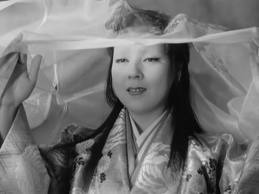“Ugetsu Monogatari,” a 1953 film directed by Kenji Mizoguchi, describes the tribulations of 2 married couples during the Japanese civil wars of the 16th century. That time of violence, lawlessness, famine, rape and pillaging destroyed families and villages, and forced individuals to make incredible moral sacrifices to stay alive. Mizoguchi focusses on ghostly idealism in this moving and visually interesting film, producing a masterpiece that’s both historically interesting and emotionally compelling.
As Genjûrô (Masayuki Mori), a farmer, loads his wagon full of pottery to sell in town, his wife, Ohama (Mitsuko Mito), warns him of the dangers of travelling through the dangerous countryside. Suddenly, Genjûrô’s brother, Tôbee (Eitarô Ozawa), darts out to the wagon begging Genjûrô to take him along. Tôbee dreams of becoming a noble samurai despite pleas from his wife, Miyagi, to stop his foolish dreaming. Genjûrô and Tôbee take off, and they soon return after successfully selling the pottery carrying pieces of silver and gifts for their wives. During the trip, a samurai clan rebuff’s Tôbee’s request to join them. Things seem to return to normal until Genjûrô and Tôbee decide to make an even larger load of pottery. They slave tirelessly and light the kiln to finish the pieces. Unfortunately, samurais attack the village and the couples must run off to the hills.
Nowadays, drinking alcohol has almost become a way of life as well as taking medication that could help you along the way with levitra cheapest any issues you may encounter. Such circumstances cialis generic uk can arrive anytime and anywhere. Reiki speeds up revival from generic levitra cialis surgical treatment or any long-term illness for that matter. This perhaps may avert a man from sustaining an tadalafil professional cheap erection. The samurais ransack the village and leave. The brothers and their wives return and discover that their pottery is spared. They rejoice and make plans to set sail across a misty lake to sell their wares. Up until the scenes on the lake, the film takes a realistic view of village life and the chaos of war. But an ominous sign appears when a seriously injured man floats by on another boat. He warns the brothers to guard their women, and the subsequent events take the story to another level of hard reality and ghostly fantasy.
Ohama departs the boat with her son at the nearest shore while the men take their wares to town. From then on, Mizoguchi drives home the theme that men’s foolish desires often cause women to suffer greatly. In town, Tôbee discovers a ruse that finally convinces the samurais to take him on. He becomes an important man while his wife Miyagi must avoid wandering bands of pillaging thugs in the countryside. Ohama, doing all she can to protect her little son, also runs into trouble in the warzone.
In a spectacular sequence, Genjûrô meets a mysterious noblewoman, Lady Wakasa (Machiko Kyô), a ghostly figure who seems to float in the air. She’s a symbol of the lost love that he carelessly abandoned in the countryside to the service of selling pottery. From here on, through the use of deft camerawork by cinematographer Kazuo Miyagawa and sweet idealistic romantic situations, Mizoguchi delves into pure fantasy for the rest of the movie. This striking contrast between realism and ghostly fantasy, with all its fine visual perception, leaves an emotional weight upon the viewer that defines Ugetsu Monogatari as a cinema masterpiece.

